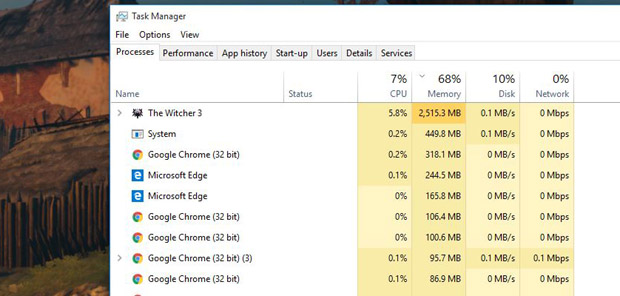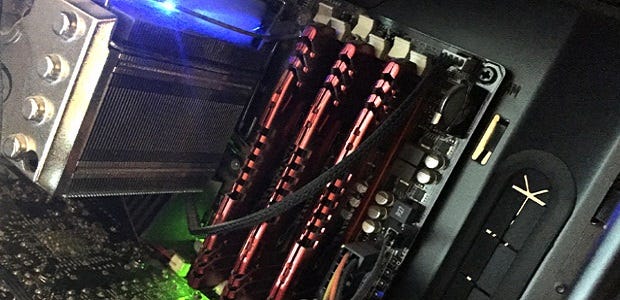How Much Memory Do You Need For Games?
16 is twice as good as 8. Probably
Do not glaze over. Or leg it in favour of a CaptainSparklez binge session on YouTube. We're going to muscle through this together. By 'this' I mean the not-obviously-scintillating matter of system memory, also known as RAM. More specifically, I'm talking about two key questions. Does it matter what kind of memory you use? And how much of the stuff do you need? You know. For games. Luckily, this subject lends itself rather nicely to the sort of easy, sweeping and simplistic generalisations of which pathologically idle journalists are fond. But that's good for you, too, as it means this stuff isn't actually all that complicated and some actionable answers are attainable. These answers, in fact.
TL;DR
- 16GB of RAM is only about $40 / £35 more expensive than 8GB.
- If you are building a PC, go for 16GB of RAM. Don't worry too much about the detailed spec. Just make sure it's compatible.
- If you have a stable rig with less than 16GB, consider upgrading but bear in mind the ongoing transition from DDR3 to DDR4 for Intel's new Skylake CPUs and AMD's upcoming Zen chips.
- In the unlikely event you only have 4GB, upgrade to at least 8GB immediately.
Remember this
Like most things when it comes to PC performance, what you absolutely, positively need and what will make your computing life in general more pleasant and your gaming in particular more enjoyable aren't the same thing.
There's a minimum you can get by with but that will drive you utterly mad. And then there's the point beyond which the returns begin to diminish rapidly. It's that latter metric I'm interested in.
 If modern games only take up this much space, what's all the fuss about?
If modern games only take up this much space, what's all the fuss about?
Think of it this way. You might technically be able to play a game with 4GB of RAM, but the level load times will be catastrophic, and you'll have a permanent hangover thanks to the application switching lag and the general sluggishness of it all. On the other hand, while there may be theoretical gaming scenarios in which more than, oh I dunno, 16GB is of benefit, they're so rare as to be effectively irrelevant to nearly all of us nearly all the time.
Capacity is king
Why does memory amount as opposed to memory speed impact your PC's performance?
The answer is pretty simple. The software and applications you run have a certain memory footprint. Whether it's a browser tab or a high-end game, the data needs to live somewhere. In practice, there are three main places. The cache in your CPU (not very big and in any case largely data mirrored with RAM), your system memory or RAM and the hard disk.
For an application you aren't running at all, even in the background, it can reside in hibernation on the hard disk. But for an app you are using, it needs to all fit in RAM to ensure speedy access. Because RAM is orders of magnitude faster than a hard disk. Even the fancy SSD sort of hard disk.
When you run out of memory or RAM, the operating system will fall back on the hard disk as a memory cache. It's what's known as “disk swapping”. A typical example might be multi-tasking, switching from one application window to another. If you've run out of RAM, the OS will park the minimised application in part or whole on the hard disk. Switch back and there's a huge lag as the operating system retrieves that application and sticks the other one onto the hard drive. Hence the 'swapping'.
What about games?
In theory, once a game is up and running, you're golden. The loading might be delayed by limited memory but once space has been freed up by dumping application states onto the hard drive, you're good to go, yeah? And the vast majority of games will fit inside 8GB comfortably, right?
Firstly, I don't much like that approach even if all of the above is accurate. I'm a computing slob and prefer to keep my system 'up' and never close things unless I'm completely done with them. A quick snapshot of my Task Manager right now reveals a 10GB overall footprint. Mostly because I have, measured courtesy of a damp finger thrust ceilingwards, roughly 120 browser tabs open in about 10 windows. And Photoshop with a load of preposterously high res PR images for an article that was due last week. And a bunch of other stuff. This is normal, isn't it?
 All completely normal, nothing to see here...
All completely normal, nothing to see here...
Now, I currently have 12GB of RAM (creaking old LGA1366 rig on account of breaking my LGA2011, I'm afraid). Thus if I fire a game up without first closing a load of windows, something has to give. A quick look at Witcher III in Task Manager reveals an additional 2.5GB footprint and The Wild Hunt isn't a particularly demanding game, memory wise.
But even if the game does fit inside the available memory, you want some spare capacity to allow for everything from background processes to the adjustments in footprint that the game itself might make. Anytime you breach the memory barrier and start disk swapping, things are going to get very choppy indeed. With games that stream worlds and new levels on the fly as opposed to traditional level loading, that could be very painful.
Windows memory management
Things get more complicated when you factor in how Windows manages memory. There's physical memory space, virtual memory space, memory usage, cached memory, pools and paged pools. I really don't want to get too distracted by the nuances here but the short version that simplifies things to the point where accuracy is lost but my word count doesn't get completely out of control goes something like this.
There's an amount of physical memory an app or game needs to run. That's the amount you'll see allocated specifically to the application in Task Manager. But Windows has the option of caching further application data given sufficient memory space. That forms part of the generic 'cached' memory amount, again as shown in Task Manager.
Put simply, the more Windows can cache in RAM, the less frequent the disk access and the faster your PC will feel, generally speaking. Exactly how relevant this is to precisely which games isn't something I know in detail.
Can you afford not to?
The point I'm making here, I should emphasise, does not depend on running exotic mods with games like Skyrim and generating an 8GB footprint with that alone. It doesn't even depend on the fact that recent titles like Star Wars Battlefront have hefty minimum official requirements for 8GB of memory.
Likewise, we could argue the toss with my contrived multitasking examples. Some will say they don't get near my 10GB, day to day, and anyway, just close some of those bloody Chrome tabs. Which is all fine. But here's the kicker. At one of the more obvious reference points, namely www.crucial.com, the difference between a dirt cheap 8GB DDR3 kit and a dirt cheap 16GB kit is about $40 / £35. The gap is about the same for fancier kits, it's just the baseline is a bit higher. So I put it to you. Can you afford not to run 16GB of RAM?
 Is Star Wars Battlefront's minimum 8GB official requirement the shape of things to come?
Is Star Wars Battlefront's minimum 8GB official requirement the shape of things to come?
Of course, memory is also the kind of component you can reuse. The slight snag with that is the ongoing transition from DDR3 memory to DDR4 for Intel's new Skylake CPUs and indeed AMD's upcoming Zen chips. But worse case scenario, that's an extra 40 bucks twice. Thus, to me this is a no-brainer. The jump up to 32GB, incidentally, is financially more onerous, especially in dual-stick form, and the rewards even less clear cut.
Why speed doesn't matter
But hang on, I haven't mentioned memory speed or detailed specification. Frequencies, CAS latencies, that kind of thing. That's because it mostly doesn't matter. The two C's of compatibility and capacity are king. That's been true in recent years even for overclocking. In the old days, overclocking a CPU via the system bus could depend at least to an extent on your memory having a little headroom, too. These days, with multiplier and dividers, it's either a total non issue (an unlocked CPU) or probably a non issue (the latest Intel Skylake CPUs tweaked via the baseclock).
I grant there's a degree of nuance I'm glossing over with the latest Skylake chips, something I may look at in future if there's sufficient interest. But broadly, memory speed as opposed to capacity is usually a minor issue with modern CPUs and platforms.
Ultimately, then, my argument hinges on the pricing aspect. Keep your applications in trim and 8GB will be plenty for most games, most of the time. Thus, if 16GB cost hundreds more than 8GB, I'd be much more circumspect. But it doesn't. So I'm not.
Put yet another way, surely $40 / £35 is a price worth paying to be able to just run as much crap as you want, when you want, to jump in and out of games on a whim?
I'll answer that for you. It is. Well worth it. So bag 16GB of compatible memory. And get gaming.
